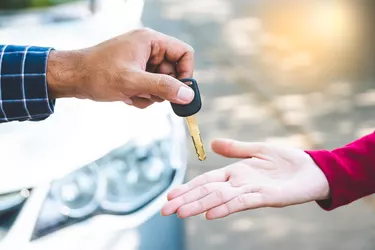
State law determines who can sell the car of a deceased person and how they should do so, but the issue boils down to one pivotal question: Who inherits the car? That individual has the right to sell it, and the vehicle must to transferred into their ownership first so they can then, in turn, pass the title on to a buyer.
The process can depend on whether the decedent's estate requires probate, and on state procedures for transferring title if it does not.
Video of the Day
Video of the Day
The Probate Process
Probate is the legal means by which a deceased person's assets transfer into the ownership of a living individual. An executor is appointed by the probate court to oversee and manage the probate process, and one of the executor's first responsibilities is to gather the decedent's assets. This would include any automobiles they owned.
Some states, including California, require probate even if there is a will if the value of the estate's assets is over a certain amount. Vehicles can become part of a decedent's probate estate simply based on their value. For example, the magic number in New York is $25,000. The car is effectively owned by the estate if it's worth more than this. The executor would sign over the title certificate to an heir or a beneficiary, who can then sell the car.
The executor might be required to sell the car instead, however. Probate also ensures that the decedent's debts are paid, and executors sometimes have to liquidate estate assets to do so if the deceased didn't leave sufficient cash.
Transfers Without Probate
The question can become more complicated when an estate doesn't require probate. For example, Vermont requires a letter from the court explicitly stating that there's no probate estate and naming the individual who is entitled to receive the car. The letter and supporting documentation can then be presented to the Department of Motor Vehicles. Oregon has a similar process. It will accept a notarized affidavit.
Alabama and California provide dedicated forms for an heir to take ownership, or an heir can sell the vehicle directly to someone else without first taking ownership by also providing a bill of sale to the DMV.
Direct Transfers of Ownership
In some cases, the car might bypass probate and transfer directly to a living heir by operation of law, and that individual would have the right to sell it. New York law automatically gives the vehicle to the surviving spouse if it's worth $25,000 or less, or to the deceased's minor children if there is no surviving spouse. The spouse or a guardian on behalf of the minor must then submit a notarized affidavit and a copy of the death certificate to the DMV to take ownership and transfer it to a buyer.
Vermont has a similar procedure if the car is titled to tenants by the entirety, a form of joint ownership reserved for married couples.
Cars can also be jointly owned by people who aren't married to each other. The vehicle would automatically transfer to the survivor in this case, who would then be entitled to sell it. The survivor might be required to first title the car into their sole name, however.
The Bottom Line
Anyone can sell a car if they legally own it. The catch after the original owner dies is to establish ownership in someone else's name first, and that process depends heavily on state law. Your best bet is to check the state's DMV website for detailed information as to what's required where the decedent lived, not where you reside.